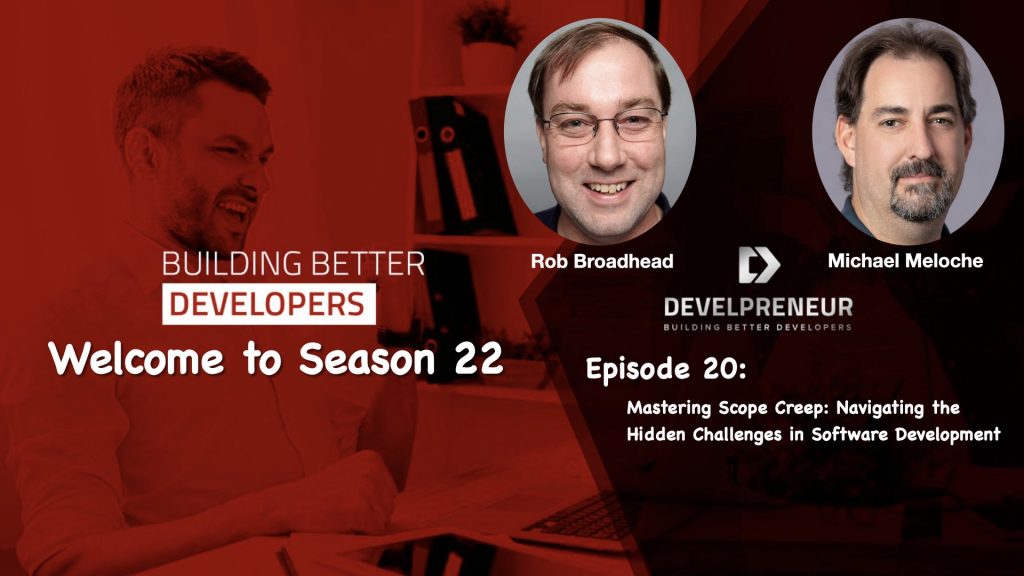Welcome back to the Building Better Developers Podcast, where we continue to explore the developer journey—from novice to expert—focusing on practical skills and mindset shifts that turn good developers into great ones. In this episode, we dive deep into a critical topic that affects developers at every stage of their careers: scope creep, requirements management, and defining what it means to be “done.”
Understanding Scope Creep
Scope creep is a familiar challenge in software development. It occurs when the project’s scope expands beyond its original boundaries, often leading to cost overruns and missed deadlines. However, scope creep isn’t always as straightforward as it seems. We discuss its nuances and how it can be misinterpreted in different contexts.
A key point is the distinction between adding new features and uncovering missed requirements. Sometimes, what seems like a new feature is a previously unidentified requirement. This distinction is crucial because it changes how the issue should be addressed. If a requirement was missed initially, it’s not just a case of scope creep; it’s a flaw in the original project planning.
The Importance of Clear Requirements
Our discussion emphasizes the critical role of clear, well-defined requirements in avoiding scope creep. Poorly defined or incomplete requirements are a primary cause of scope creep. If a developer assumes they understand the requirements without fully clarifying them, they risk building something that doesn’t meet the project’s needs. This leads to delays, additional costs, and frustration on both sides.
We suggest a proactive approach to gathering and refining requirements to mitigate this. Developers should always ask questions, clarify any ambiguities, and ensure they understand the entire process or system they are working on. This diligence can prevent many of the issues that lead to scope creep later in the project.
Defining “Done”
We discussed the concept of “done” as another crucial aspect of project management. In Agile methodologies, “done” should be clearly defined and agreed upon by all stakeholders before work begins. This includes not only completing the required features but also ensuring they function correctly and meet all specified requirements.
It is also important to break down larger projects into smaller, manageable pieces. This allows developers to deliver incremental progress and ensures that each stage meets the definition of “done” before moving on to the next. By doing so, developers can avoid the pitfalls of monolithic projects, where the definition of “done” becomes blurred, leading to scope creep and other issues.
Avoiding Self-Imposed Scope Creep
We also touched on a lesser-discussed form of scope creep: self-imposed scope creep. This happens when developers add features or enhancements that were not part of the original requirements simply because they believe these additions would improve the project. While well-intentioned, this can lead to missed deadlines and dissatisfaction from clients who didn’t ask for these “extras.”
The advice here is clear: stick to the requirements. Developers should focus on delivering what was agreed upon and avoid the temptation to add unnecessary features. This discipline ensures that projects stay on track and meet the client’s expectations.
The Role of Testing in Managing Scope Creep
Testing plays a vital role in managing scope creep and ensuring that the project stays on course. Michael encourages developers to adopt a test-driven approach where possible. By starting with the end product in mind and testing each stage against the defined requirements, developers can catch potential issues early and avoid costly rework later.
Final Thoughts
The episode wraps up by reinforcing the idea that being a better developer isn’t just about writing good code quickly. It’s about understanding the broader context of the project, asking the right questions, and managing both the technical and non-technical aspects of development effectively. By doing so, developers can avoid the common pitfalls of scope creep, deliver projects on time, and meet (or exceed) client expectations.
In conclusion, managing scope creep, clarifying requirements, and defining what “done” means are essential skills for developers at any level. As you continue your journey in software development, keep these principles in mind to build better code and better projects overall.
Stay Connected: Join the Developreneur Community
We invite you to join our community and share your coding journey with us. Whether you’re a seasoned developer or just starting, there’s always room to learn and grow together. Contact us at [email protected] with your questions, feedback, or suggestions for future episodes. Together, let’s continue exploring the exciting world of software development.

